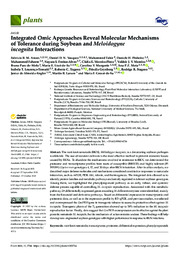Integrated omic approaches reveal molecular mechanisms of tolerance during soybean and meloidogyne incognita interactions.
Integrated omic approaches reveal molecular mechanisms of tolerance during soybean and meloidogyne incognita interactions.
Summary: The root-knot nematode (RKN), Meloidogyne incognita, is a devastating soybean pathogen worldwide. The use of resistant cultivars is the most effective method to prevent economic losses caused by RKNs. To elucidate the mechanisms involved in resistance to RKN, we determined the proteome and transcriptome profiles from roots of susceptible (BRS133) and highly tolerant (PI595099) Glycine max genotypes 4, 12, and 30 days after RKN infestation. After in silico analysis, we described major defense molecules and mechanisms considered constitutive responses to nematodeinfestation, such as mTOR, PI3K-Akt, relaxin, and thermogenesis. The integrated data allowed us to identify protein families and metabolic pathways exclusively regulated in tolerant soybean genotypes. Among them, we highlighted the phenylpropanoid pathway as an early, robust, and systemic defense process capable of controlling M. incognita reproduction. Associated with this metabolic pathway, 29 differentially expressed genes encoding 11 different enzymes were identified, mainly from the flavonoid and derivative pathways. Based on differential expression in transcriptomic and proteomic data, as well as in the expression profile by RT?qPCR, and previous studies, we selected and overexpressed the GmPR10 gene in transgenic tobacco to assess its protective effect against M. incognita. Transgenic plants of the T2 generation showed up to 58% reduction in the M. incognita reproduction factor. Finally, data suggest that GmPR10 overexpression can be effective against the plant parasitic nematodeM. incognita, but its mechanism of action remains unclear. These findings will help develop new engineered soybean genotypes with higher performance in response to RKN infections.
Publication year: 2022
Types of publication: Journal article
Unit: Embrapa Agroenergy
Observation
Some of Embrapa's publications are published as ePub files. To read them, use or download one of the following free software options to your computer or mobile device. Android: Google Play Books; IOS: iBooks; Windows and Linux: Calibre.
Access other publications
Access the Agricultural Research Database (BDPA) to consult Embrapa's full library collection and records.
Visit Embrapa Bookstore to purchase books and other publications sold by Embrapa.

